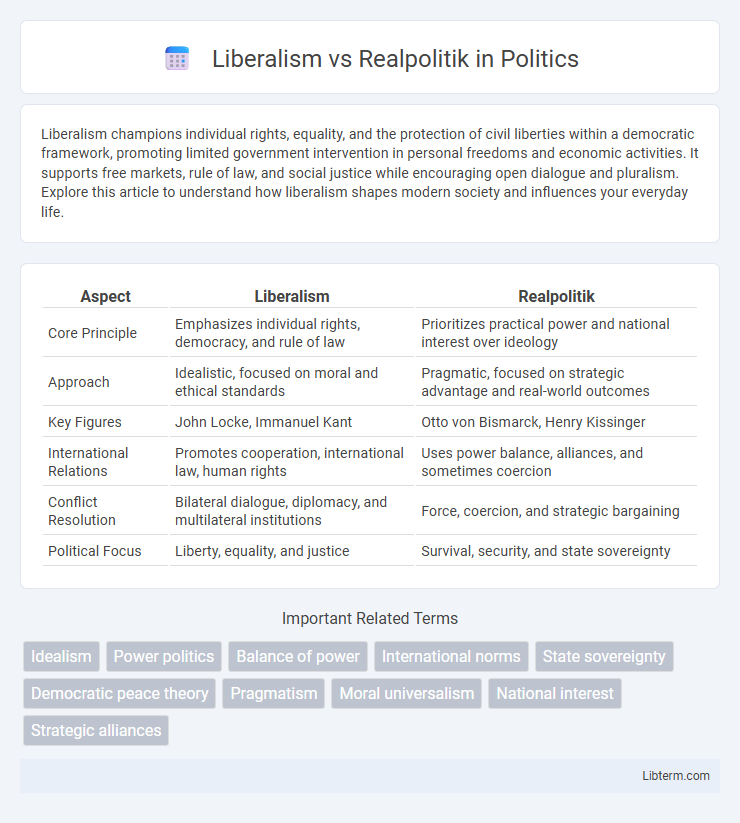Liberalism champions individual rights, equality, and the protection of civil liberties within a democratic framework, promoting limited government intervention in personal freedoms and economic activities. It supports free markets, rule of law, and social justice while encouraging open dialogue and pluralism. Explore this article to understand how liberalism shapes modern society and influences your everyday life.
Table of Comparison
| Aspect | Liberalism | Realpolitik |
|---|---|---|
| Core Principle | Emphasizes individual rights, democracy, and rule of law | Prioritizes practical power and national interest over ideology |
| Approach | Idealistic, focused on moral and ethical standards | Pragmatic, focused on strategic advantage and real-world outcomes |
| Key Figures | John Locke, Immanuel Kant | Otto von Bismarck, Henry Kissinger |
| International Relations | Promotes cooperation, international law, human rights | Uses power balance, alliances, and sometimes coercion |
| Conflict Resolution | Bilateral dialogue, diplomacy, and multilateral institutions | Force, coercion, and strategic bargaining |
| Political Focus | Liberty, equality, and justice | Survival, security, and state sovereignty |
Understanding Liberalism: Core Principles and Values
Liberalism centers on individual freedoms, democracy, and the protection of human rights, emphasizing the rule of law and equality. It advocates for international cooperation, free trade, and institutions that promote peace and mutual benefit among states. The ideology prioritizes moral values and ethical considerations in both domestic and foreign policies, contrasting with the pragmatic and power-focused approach of Realpolitik.
Defining Realpolitik: Pragmatism in International Relations
Realpolitik emphasizes pragmatic decision-making based on practical objectives and the pursuit of national interest rather than ideological or ethical considerations. Rooted in 19th-century European diplomacy, it prioritizes power dynamics, strategic alliances, and real-world outcomes over abstract principles. This approach shapes international relations by promoting flexibility and adaptability in response to shifting geopolitical realities.
Historical Roots of Liberalism and Realpolitik
Liberalism traces its historical roots to the Enlightenment era, emphasizing individual rights, constitutional governance, and free-market principles inspired by thinkers like John Locke and Adam Smith. Realpolitik emerged in the 19th century, particularly influenced by Otto von Bismarck's pragmatic and power-focused approach to statecraft, prioritizing national interest and practical considerations over ideological commitments. The distinct origins highlight liberalism's foundation in moral philosophy and political theory, contrasted with Realpolitik's basis in strategic realism and geopolitical pragmatism.
Key Thinkers and Philosophers: Influences and Legacies
Liberalism, shaped by thinkers such as John Locke and Immanuel Kant, emphasizes individual rights, rule of law, and the promotion of democratic governance as pathways to peace and cooperation. Realpolitik, influenced by Niccolo Machiavelli and Otto von Bismarck, prioritizes pragmatic statecraft, power dynamics, and national interest over ideological considerations in international relations. The legacies of liberalism inspire institutions like the United Nations promoting collective security, while Realpolitik underpins contemporary geopolitical strategies centered on power balance and strategic alliances.
Liberalism vs Realpolitik: Contrasting Worldviews
Liberalism advocates for international cooperation, democratic governance, and the promotion of human rights as fundamental drivers of global stability and peace. Realpolitik prioritizes national interest, power dynamics, and pragmatic decision-making over ideological or ethical considerations in foreign policy. These contrasting worldviews shape state behavior, with Liberalism fostering multilateral institutions while Realpolitik emphasizes strategic alliances and realignment based on shifting power balances.
Case Studies: Practical Applications in Foreign Policy
Liberalism in foreign policy emphasizes international cooperation, human rights, and democratic values, as seen in the European Union's promotion of diplomatic engagement and multilateral agreements. Realpolitik prioritizes state interests and power dynamics, exemplified by the U.S. approach during the Cold War with strategic alliances and pragmatic negotiations. Case studies such as the Iran Nuclear Deal illustrate the tension between liberal ideals and Realpolitik strategies, balancing diplomatic efforts with security concerns.
Evaluating Success: Achievements and Pitfalls
Liberalism emphasizes international cooperation, human rights, and democratic governance, achieving success through institutions like the United Nations that promote global peace and development. Realpolitik prioritizes pragmatic power calculations and national interest, often securing immediate strategic advantages but risking long-term instability and ethical compromises. Evaluating their success involves balancing liberalism's idealistic goals with Realpolitik's tangible outcomes, acknowledging that each approach has distinct strengths and vulnerabilities in global diplomacy.
Modern Challenges: Globalization and Power Dynamics
Liberalism emphasizes international cooperation, rule-based order, and the promotion of human rights to address globalization's challenges, advocating for institutions like the United Nations and World Trade Organization to manage interdependence. Realpolitik prioritizes national interest and power dynamics, viewing global interactions through pragmatic lenses of state sovereignty, military strength, and economic leverage in a multipolar world. Modern challenges reveal tensions between liberal ideals of global governance and Realpolitik's pursuit of strategic advantage amid shifting alliances and emerging powers.
Hybrid Approaches: Is Synthesis Possible?
Hybrid approaches combining liberalism and Realpolitik emphasize pragmatic diplomacy grounded in normative values and strategic interests. These models seek synthesis by balancing international cooperation, human rights promotion, and power politics to address complex global challenges. Scholars argue such integration enhances policy flexibility, enabling states to adapt to shifting geopolitical landscapes without sacrificing ethical commitments.
Future Prospects: The Evolving Debate in International Relations
Liberalism envisions a future of international cooperation grounded in institutions, democracy, and human rights, advocating for multilateral problem-solving and global governance. Realpolitik emphasizes power dynamics, national interest, and pragmatic decision-making, predicting continued competition and strategic alliances among states. Emerging global challenges like climate change, cyber threats, and shifting geopolitical power suggest a complex interplay where liberal ideals and Realpolitik strategies will coexist and shape future international relations.
Liberalism Infographic

 libterm.com
libterm.com